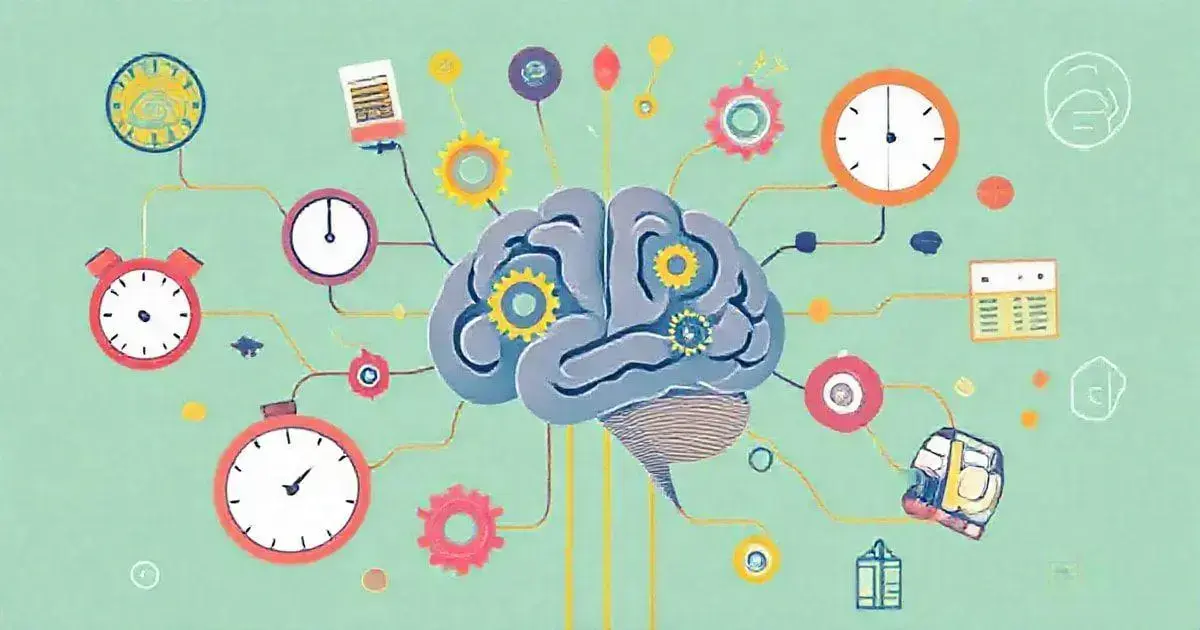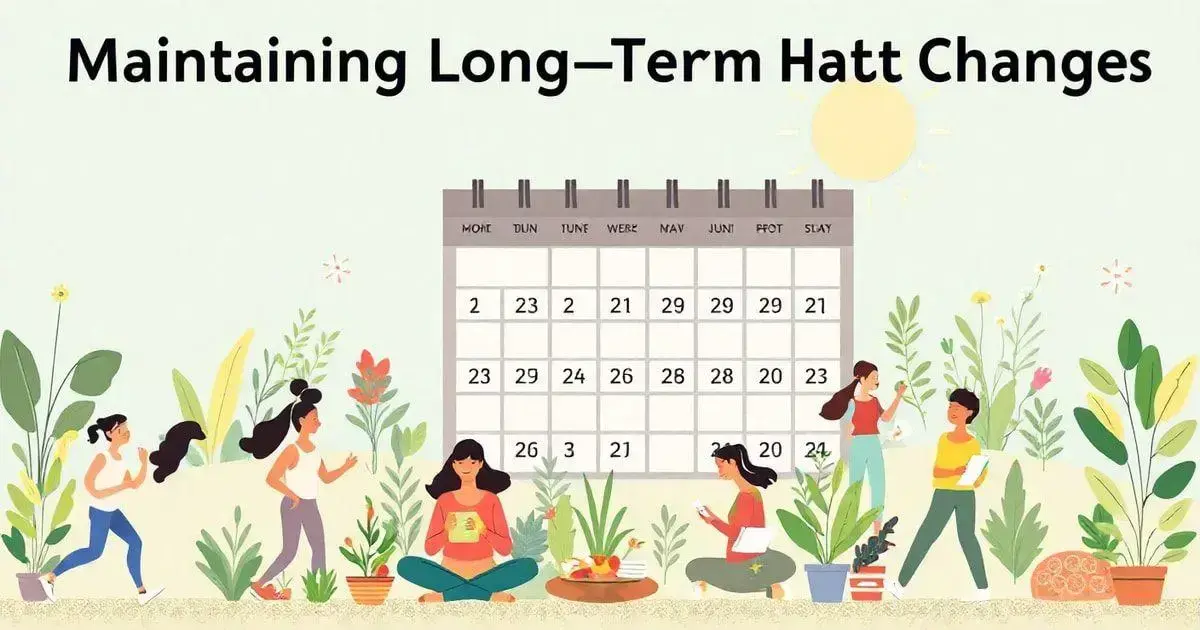Habit improvement can significantly enhance your personal and professional life.
By understanding the psychology of habits and implementing effective strategies, you can transform your daily routines and reach your goals.
Understanding Habit Improvement
Understanding habit improvement is crucial for anyone looking to make meaningful changes in their lives. Habits shape our routines, and improving them can lead to significant personal growth.
A habit is a behaviour that is repeated regularly and, often, automatically. To enhance our lives, we must first identify habits that hold us back and seek better alternatives.
One effective method for habit improvement is to focus on small, achievable changes. Instead of overhauling your entire routine, implement gradual adjustments that feel manageable. For instance, if you want to read more, start with just ten minutes a day. This way, you build consistency without overwhelming yourself.
Additionally, it’s essential to understand the triggers that lead to specific habits. By being aware of what prompts undesirable behaviours, you can create strategies to avoid or replace them. Use tools such as a journal to track your progress and reflect on your experiences. This self-awareness will propel your journey towards better habits.
Sharing your goals with others can also enhance commitment. Engage friends, family, or support groups, which can provide encouragement and accountability. Celebrating small victories along the way helps reinforce positive behaviours.
Ultimately, habit improvement is a journey. Embrace setbacks as learning opportunities and stay focused on your progress.
The Science Behind Habits

The science behind habits explains why we behave the way we do. Habits form through a process called habituation, where repeated actions become automatic. This process consists of three key elements: the cue, the routine, and the reward. A cue triggers a habit, which leads to a routine or action, and the reward reinforces the behavior, encouraging repetition.
For example, someone stressed at work might respond to a demanding task (cue) by snacking (routine), gaining a moment of comfort (reward). Understanding this loop allows you to identify and modify habits. Research shows that changing just one element—such as substituting a healthier routine—can lead to positive changes while maintaining the same reward.
Neuroscience reveals that our brains form habits to conserve energy, making repeated behaviors automatic. By leveraging this natural tendency, we can intentionally create new, beneficial habits aligned with our goals. With consistent effort, these new habits can replace old ones, becoming second nature over time.
In summary, understanding the science behind habits empowers you to take control, foster positive changes, and enhance both personal and professional aspects of your life.
Common Habits to Improve
There are several common habits that people can work on to improve their lives. One of the most impactful habits is adopting a consistent exercise routine. Regular physical activity can enhance mood, boost energy levels, and improve health. Even starting with small daily walks can lead to significant benefits over time.
Another important habit to consider is mindfulness. Practising mindfulness or meditation for just a few minutes a day can reduce stress and increase focus. This helps in becoming more aware of thoughts and feelings, allowing better management of daily challenges.
Eating healthy is also crucial. Establishing a habit of preparing nutritious meals can improve physical well-being. Incorporating more fruits and vegetables into your diet not only enhances health but can also influence positive mood changes.
Setting a regular sleep schedule is essential too. Quality sleep supports overall health and improves productivity. Aim for 7-9 hours of sleep each night to restore your body and mind.
Additionally, learning to manage time effectively is a beneficial habit. Using planners or apps can help in staying organized and prioritising tasks, leading to increased productivity.
Lastly, fostering positive relationships can greatly affect happiness. Taking time to connect with friends and family builds a support network that enhances one’s life quality.
Effective Strategies for Habit Change

Implementing effective strategies for habit change is crucial in the journey towards personal improvement. One well-known method is the SMART goal framework. This means setting goals that are Specific, Measurable, Achievable, Relevant, and Time-bound. By having clear objectives, you can track your progress and stay motivated.
Another strategy is the 2-Minute Rule. This rule suggests starting a new habit by taking a two-minute action. For instance, if you want to develop a reading habit, start by reading just one page. This makes it easier to get started without feeling overwhelmed.
Creating a supportive environment is also vital. Surround yourself with reminders of your goals. If you want to eat healthier, keep fruits visible in your kitchen. If your goal is to exercise more, lay out your workout clothes the night before.
Using technology can further aid habit change. Apps that track habits can remind you and help visualize your progress. Utilizing social media or accountability partners can also keep you motivated.
Finally, practice self-compassion. Change is difficult, and setbacks happen. By being kind to yourself and understanding that mistakes are part of the process, you can maintain motivation and resilience on your path to success.
Setting Goals for Habit Improvement
Setting goals for habit improvement is a crucial step toward achieving lasting change. Clear and well-defined goals provide direction and help maintain motivation. Start by identifying what you want to achieve. For example, if you aim to improve your health, specify your goal as “I will exercise three times a week.” This makes your intention actionable and focused.
Using the SMART criteria can enhance your goal-setting process. Ensure your goals are Specific, Measurable, Achievable, Relevant, and Time-bound. Instead of saying, “I want to read more,” reframe it as “I will read one book per month.” This approach adds clarity and makes tracking progress easier.
Break large goals into smaller, manageable steps to reduce overwhelm and build momentum. For instance, if your goal is to eat healthier, start by incorporating one nutritious meal per day rather than attempting a complete diet overhaul. These small victories build confidence and reinforce your commitment.
Accountability is another vital factor. Share your goals with friends or family who can encourage and support you. Having someone to check in with can keep you motivated and focused on your objectives.
Lastly, celebrate your successes, no matter how small they may seem. Recognizing your achievements reinforces positive habits and boosts your determination to continue. Remember, goal-setting is a dynamic process, and being flexible in your approach will help you adapt and succeed.
Tracking Your Progress
![]()
Tracking your progress is a crucial step in improving habits. Regular monitoring keeps you motivated and focused on your goals. One effective way to do this is by maintaining a habit journal. Record your daily successes and setbacks, allowing you to identify patterns and understand what strategies work best for you.
Technology can also be a valuable tool for tracking progress. Numerous apps are available to help log activities, set reminders, and display progress charts. These features make it easier to stay consistent and motivated as you work toward your goals.
Setting milestones is another powerful method. Celebrate small victories along the way instead of waiting for the ultimate goal. For example, if your goal is fitness-related, reward yourself for completing a week of workouts or reaching a specific number of sessions. These milestones help sustain momentum and provide a sense of accomplishment.
Regularly reviewing your progress is equally important. Take time weekly or monthly to evaluate your achievements and identify areas for improvement. If certain habits aren’t working, use this reflection to adjust your approach. Acknowledging what’s going well helps maintain a positive outlook and keeps you focused.
Lastly, involve others in your journey. Share your goals with friends or family and encourage them to check in on your progr
Overcoming Obstacles
Overcoming obstacles is a vital part of the habit improvement journey. Everyone faces challenges when trying to change their behaviour. Recognising these obstacles is the first step towards defeating them. Common hurdles include lack of motivation, time constraints, and fear of failure.
To tackle lack of motivation, it helps to remind yourself of the reasons behind your goals. Write these reasons down and refer to them when you feel your enthusiasm waning. You can also set up a reward system for achieving small milestones. Celebrating these victories keeps you engaged and motivated.
Time constraints can be addressed by making a schedule that includes your new habits. Prioritising your goals helps to ensure that you set aside time for them each day. Remember, even small increments of time can lead to substantial changes over time. For example, if you want to read more, set aside just ten minutes before bed.
Overcoming the fear of failure is crucial. Understand that mistakes are part of the learning process. Instead of viewing setbacks as failures, see them as opportunities to grow. Reflect on what went wrong and how you can adjust your approach next time.
Lastly, seeking support from friends, family, or support groups can be very helpful. Sharing your struggles and achievements with others creates a sense of community and accountability, making it easier to push through obstacles.
Maintaining Long-Term Habit Changes

Maintaining long-term habit changes is essential for achieving your goals. It requires commitment and strategy. One effective way to ensure sustainability is to establish a strong routine. Routines help automate your new habits, making them a natural part of your daily life. For example, if you want to continue exercising, schedule it at the same time each day.
Another key aspect is self-reflection. Regularly assess your progress and how your habits affect your life. Keeping a journal can help you identify what works and what doesn’t. This practice not only tracks your success but allows you to adjust your strategies as needed.
Support systems are also crucial. Surround yourself with people who encourage your new habits. Whether it’s friends, family, or a support group, having a network can help maintain your motivation. You can share goals, celebrate victories, and discuss challenges together.
Setting long-term goals and smaller milestones can keep you focused. Celebrate these achievements to reinforce your commitment. Rewards motivate continued effort and make the process enjoyable. Make sure your rewards are healthy and aligned with your new habits.
Finally, stay flexible. Life will bring changes that can disrupt your routine. Be ready to adapt and adjust your habits as needed, rather than seeing changes as failures. Embracing adaptability will help you maintain your new habits in the long run.
Embracing Lasting Change Through Habit Improvement
Improving habits is a transformative journey that requires dedication and effort. By understanding the science behind habits, setting clear and achievable goals, tracking your progress, and finding effective strategies to overcome obstacles, you can create lasting changes in your life.
Moreover, maintaining these changes through a solid routine, regular self-reflection, and support from others can help ensure that your new habits stick. Remember to celebrate your small victories and be adaptable when faced with challenges.
Ultimately, habit improvement is not just about achieving specific goals; it is about embracing a healthier, more fulfilling lifestyle.
Check out our article on Social Connection to learn about its benefits and how to strengthen relationships in meaningful ways.
